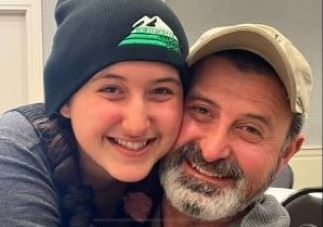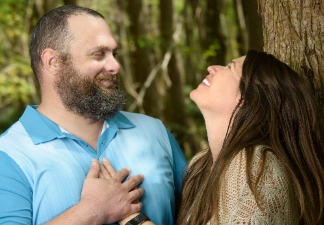Loving a Parent with PTSD: Advice from Military Kids to Other Youth

Growing up as a military kid means embracing adventure, a sense of service, and the ability to adapt. However, it also brings challenges. Frequent deployments or relocations can make it harder for military children to build lasting friendships, manage stress, and navigate their well-being.
For the 2.3 million children under 18 living with a disabled or wounded veteran, the impact can be even greater. Many of these young heroes become “hidden helpers,” assisting their families in ways most kids never have to consider.
According to the report Hidden Helpers at the Frontlines of Caregiving: Supporting the Healthy Development of Children from Military and Veteran Caregiving Homes, children from military caregiving homes are more likely than other children to be unhappy, have significant worries, or be depressed.
But they’re not alone.
Wounded Warrior Project® (WWP) recognizes the value of having access to support that helps the whole family, ensuring veterans and their loved ones – including children – have the resources they need. Military kids thrive when they feel part of a community that understands their challenges and celebrates their strengths.
The Importance of Connection for Kids
Veteran parents thrive on connection and camaraderie; the same holds true for their children. Regardless of age, military kids need spaces to share their experiences and build relationships that support their emotional and mental well-being.
Azara Emami, 14, is the daughter of two Air Force veterans and became a hidden helper at a young age. While she embraced the adventure of relocating to new places, she and her older sister, Sinaiyah, often found it hard to make friends who understood the unique challenges of growing up with a parent with significant needs.

Azara (left) and sister Sinaiyah want to help other military kids connect. The sisters launched an online support community called "We SIgned Up, Too."
Her father suffered from a traumatic brain injury (TBI), post-traumatic stress disorder (PTSD), and later, a stroke. "It was hard to talk about things that were happening because I didn’t think others could really understand,” Azara said.
For a long time, she found it difficult to confide in anyone outside her family. But after attending an event for military youth, Azara met other kids who could relate to her experiences.
She soon realized the value of having her own support network. She remembers a time when she felt overwhelmed by something related to her dad’s injuries and was able to phone a new friend who truly understood.
“I felt better after talking with them,” she said. “They got it. It's so valuable to meet people who share similar experiences and understand what I'm feeling."
To help build community, Azara and Sinaiyah have created an online blog for children of wounded, ill, and disabled veterans.
Azara knows it can feel vulnerable to connect, but she encourages others to put themselves out there. “It can take some time to meet the right crowd to lead you through. But if you get out there and be open, you will find these lifelong friendships."
Learning Better Communication Strategies with a Parent with PTSD

Lilli Coglan with her stepfather Andrew Brewer.
Lilli Coglan met the man who became her stepfather, Army National Guard veteran Andrew Brewer, when she was 4 years old. While he was warm and loving, there were times of tension, particularly between her mom and AJ, as she affectionally calls her stepdad.
Lilli, now 17, said she didn’t understand until recently the extent to which her stepfather’s PTSD affected their family dynamics.
"I noticed AJ being different when I was around 11. Everything was under a microscope, and we had to be careful about how we did things. For instance, if we shut the cabinet door too loudly, it could trigger his PTSD, so we had to be diligent about how hard we closed cabinets,” she said.
Lilli envied little things at other kids’ homes — like balloons at birthday parties — which her parents banned at her house.
“It was hard growing up. It was like we were walking on eggshells all the time, always trying to avoid making noise or something that could set him off,” she said, adding that her mom tried to protect her and her siblings, but it created more confusion and uncertainty. “Mom was trying to fix things, but then she became cranky and overstimulated. We didn’t know what was going on.”
AJ’s journey with WWP™ led him to programs like Warrior Care Network®, where he received PTSD treatment, and Project Odyssey, an adventure-based mental health retreat. As AJ healed, his family did, too.

The Brewer-Coglan family keeps a sign on their fridge as a reminder of the communications strategy they learned at Family Project Odyssey.
"We introduced 'Fight Club Rules' at home, a strategy we learned at a family Project Odyssey, where we address issues directly without letting them fester. It helped us improve our communication, avoid heated arguments, and keep a calmer household,” Lilli said.
Finding Space to Relate and Gaining Confidence
Reflecting on her participation in WWP activities and similar programs offered to military kids by WWP’s community partners, Lilli says she has grown emotionally and gained the confidence to speak up and share when things get challenging.
"One of my biggest changes was learning to communicate calmly and not just react defensively. It's made a huge difference in all my relationships.”
She also said there was immeasurable value in connecting with other military kids. “I remember one event when all the kids talked together and found this camaraderie. It made me realize our family isn't as crazy or messed up as I thought,” she said.
Lilli encourages other military children to embrace new opportunities and seek out supportive communities.
"You're not losing anything by reaching out. Nothing is being taken away, but you're gaining so much,” she said.
The Role of WWP and Partner Organizations to Enhance Family Resiliency
WWP is committed to serving wounded veterans and supporting military families. However, no single organization can meet these needs alone. That is why WWP invests in other veterans service organizations and dozens of community partners.
Hopefully, by extending the reach of programming and resources for military youth, more children like Azara and Lilli can find connection, support, and renewed confidence.
|
Did You Know? |
|
The Hidden Helpers at the Frontlines of Caregiving report highlights several key findings:
|
Contact: Cynthia Weiss – Public Relations, cweiss@woundedwarriorproject.org, 904. 738.2589
About Wounded Warrior Project
Since 2003, Wounded Warrior Project® (WWP) has been meeting the growing needs of warriors, their families, and caregivers, helping them achieve their highest ambitions. Learn more about the Wounded Warrior Project.


